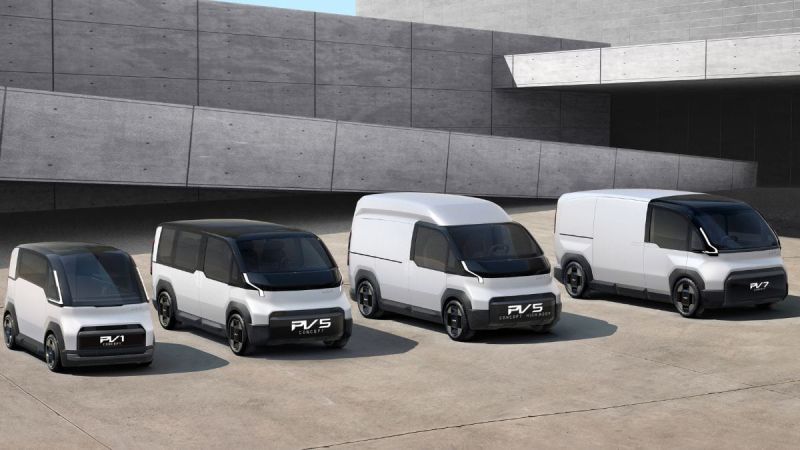Well to some extent that is an evolving concept, but for starters Kia’s PBV solutions are intended to “enhance versatility, catering to business and individuals… offer[ing] users a blank canvas to redefine how space and mobility can adapt to their needs by providing exceptional flexibility through radical modularity”. Radical modularity, sounds a little like an 80’s cover band, right? If we can just excuse Kia’s marketing speak for a bit, the concept is an interesting one. Say you’re in need of a cargo van (one that comes in sizes from large to K car size), an Uber vehicle that can haul 4 or more people and a lot of stuff, a vehicle that can accommodate passengers in wheelchairs, a posh family wagon for carting around your brood, a small RV or perhaps a mobile office space, Kia has a PBV for you! And now let’s say you want more than one of these things, in one vehicle, again Kia’s got you covered. You don’t even have to worry about your folding dining room table doubling as your office desk, per se, because these PBVs will also include swappable bodies! Pick your jaw up off the floor please, Kia just changed everything!
Or maybe not, but we’ve got to acknowledge that Kia is giving us a very different glimpse of what EVs can offer: not only freedom from the limitations of engine bays and transmission tunnels, Kia also simultaneously expands the confines of one car, one body. It may sound like the automotive parallel of an open relationship, but there truly is a business case here, one that includes vehicles that are spacious, (re)configurable, all-electric, and blend the right opportunity for comfort and capability. Here’s more of what the marketers think this all means to Kia’s product line: five distinct PBVs will “enhance versatility” while catering to both businesses and individuals, utilizing “advanced software” and “bespoke services” that will revolutionize the “mobility industry while helping advance Hyundai Motor Group’s (HMG) ambitions in robotics, Advanced Air Mobility, and autonomous driving”. Wait, air mobility?! We just jumped the shark, I think, as soon as this stopped being about vehicles meant for the asphalt (side note, HMG is interested in air mobility too, but I digress). Otherwise, Kia (and HMG by extension) is going after a different customer segment than just the typical private vehicle owner with its PBV line. They seek to “open the door to new businesses and lifestyles by redefining the concept of space thanks to advanced, tailored interiors that provide freedom and flexibility”, or in other words, the PBV is highly configurable, on the inside. Note, there’s nothing “new” under the sun, so this writer isn’t falling for the whole new lifestyle or redefining of the concept of space jargon, which is basically Kia playing with interior design. Imagine a different definition of space (or time!) brought to you by Kia, not to mention a heretofore unknown lifestyle, now it sounds a bit Star Trek-ish. When it comes to the needs of users that might use a wheelchair though, I can definitely get behind Kia’s market speak and product innovation (as we all should). The flexibility Kia is talking up is also of tremendous value to commercial customers too, but that is less revolutionary when you consider all the existing chassis out there that already come with some degree of modular configuration.The sizing of Kia’s PBVs offers some very interesting possibilities. Imagine individual and small family electric RVs and people movers that are more functional but in a smaller package. These are options we are sorely lacking in now. Perhaps more interesting than all of this, in Kia’s announcement, is that Kia “plans to launch a dedicated business system, encapsulating various aspects of the process, from the product line-up to integration of software solutions, and global partnerships” in order to sell its PBVs, a process that will include “customer participation-based development process… to create more tailored, mission-specific solutions”, something that sounds straight out of a software company’s playbook.
So Kia is very serious about their forthcoming PBV line, and we should be too, because of the very important customer base it may reach (and empower with easier mobility solutions) and the possibilities it will create. Are you interested, even excited about these PBVs? Or do you find their cuteness to be a little off-putting, perhaps making it hard to take Kia seriously? Please leave your questions and comments below.
Images courtesy of Kia.
Justin Hart has owned and driven electric vehicles for over 15 years, including a first generation Nissan LEAF, second generation Chevy Volt, Tesla Model 3, an electric bicycle and most recently a Kia Sorento PHEV. He is also an avid SUP rider, poet, photographer and wine lover. He enjoys taking long EV and PHEV road trips to beautiful and serene places with the people he loves. Follow Justin on Torque News Kia or X for regular electric and hybrid news coverage.
Set Torque News as Preferred Source on Google











